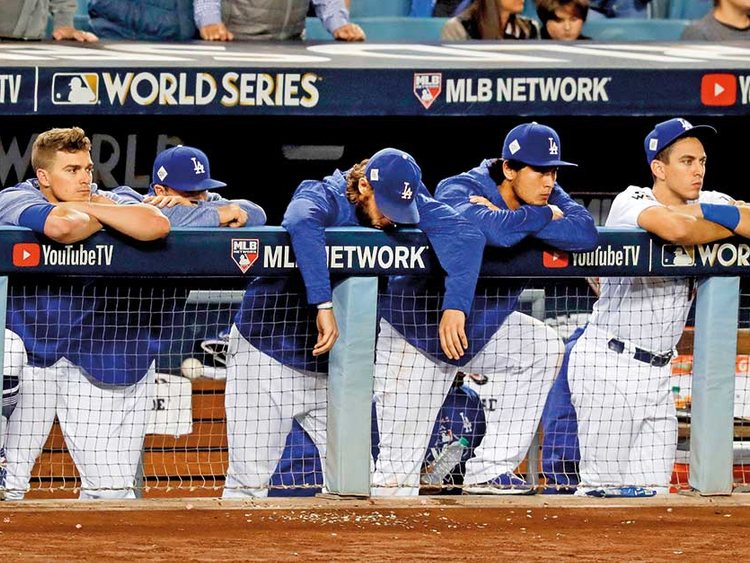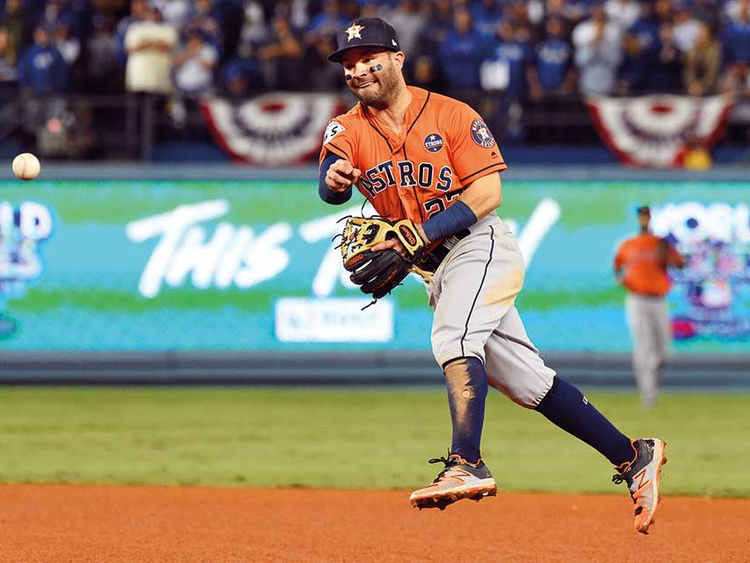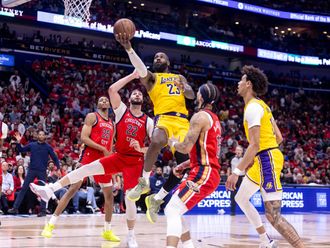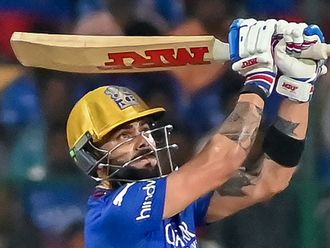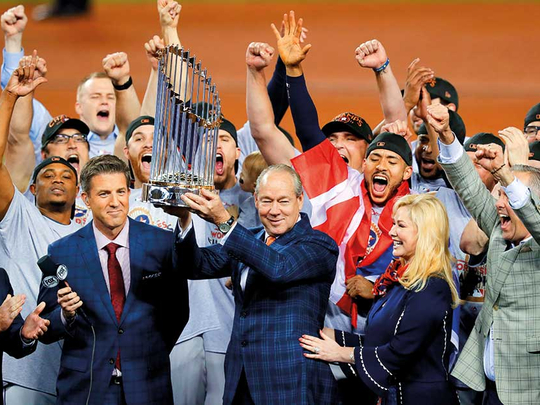
Los Angeles: As they woke from restless sleep on the first day of November, as they stared into their morning coffee, as they held their faces under their hotel-room showers, as they gazed out of bus windows at the grey haze of afternoon on their way to work, the Houston Astros couldn’t shake the magnitude of what was to come. They have spoken openly about the awe they have felt playing at some of the game’s most storied venues during these play-offs, but nothing that came before would compare to this: Game 7 of the World Series at Dodger Stadium. They told themselves their time had come.
And as they came hurtling out of their dugout after the final out on Wednesday night, amassing behind the pitcher’s mound and tossing gloves, hats and care to the air, they did so with all the euphoria befitting a franchise’s first World Series title, and with all the confirmation they needed: This was the Astros’ time after all.
In a definitive and thorough 5-1 victory over the Los Angeles Dodgers, the American League-champions Astros broke a taut, nine-day stalemate with the National League champs, in a series full of intrigue and drama, and validated the organisation’s long teardown and rebuild that for a long while made them a laughing stock of the game.
The Astros, a 101-win juggernaut during the regular season, won the first World Series title in their history — 55 years after being born as the Colt .45s, 12 years after losing to the Chicago White Sox in their only other Series appearance, four years after their teardown bottomed out with 111 losses, three years after Sports Illustrated foresaw their rise and anointed them ‘Your 2017 World Series Champs’ and two months after Hurricane Harvey devastated the Houston area and thrust the Astros into the centre of the region’s emotional rebuild.
If the Astros truly believed their time had come, it was hard to argue otherwise. It was all lining up for them, from the fateful blessing of the 2014 magazine cover to the karma of representing a hurricane-ravaged city to the way Game 7 meandered and flowed and wound up delivering the perfect Astros ending: four exquisite innings of relief from right-hander Charlie Morton, a starter by trade, an assassin by demeanour.
Dodger Stadium, the third-oldest stadium in baseball, the one-time home of Don Drysdale and Sandy Koufax and Kirk Gibson, had never hosted a World Series Game 7. Baseball hadn’t seen two 100-win teams in a World Series Game 7 since 1931. The stage was set for a topper to one of the wildest, most exhilarating World Series in history. It just didn’t quite work out that way.
The Astros, resplendent in their orange tops and grey pants, ambushed Dodgers starter Yu Darvish for the second time in five days, putting up five quick runs before Dodgers manager Dave Roberts could get him out in the second inning, silencing a raucous crowd of 54,124.
George Springer, the new Mr November, doubled to lead off the game and came around to score, then crushed a two-run homer to left-Centre in the second inning to give the Astros a 5-0 lead and end the nasty, brutish and short outing of Darvish.
Springer, who became the first hitter in history to hit homers in four straight games in the same World Series, was named the most valuable player — but in terms of his total contribution to the Astros’ victory, it could be argued no one was more valuable than Darvish.
Darvish, acquired at the July 31 trade deadline at a cost off three prospects, threw his first pitch at 5.21pm. Pacific time, and by 5.23 was trailing by a run. By 5.25, he was down two. Darvish collected a total of 10 outs in his two World Series starts against the Astros, leaving him with a 21.60 ERA for the series and taking a chainsaw to his upcoming free agent market.
Three pitchers who had started games earlier in the series appeared in relief on Wednesday, as both teams exhausted every fibre of every usable arm on their staffs. Dodgers ace Clayton Kershaw delivered four brilliant innings to keep the Dodgers in striking distance, and teammate Alex Wood got the last six outs for the Dodgers.
But it was Morton, pitching in relief on three days’ rest, who earned the victory with an overpowering, four-inning relief stint.
The Dodgers knew they had the services of Kershaw at some point, despite his having started three nights earlier in Game 5, and might have loved to have saved him for the end of the game; instead, they brought him in to start the third inning, and he restored order to the proceedings by holding the Astros scoreless for four dazzling innings. (That, in turn, raised another question: if the Dodgers were going to stay with Kershaw this long, why not bring him into the game in the second, before Darvish’s outing got out of hand?)
In any case, the Dodgers had bigger problems to consider: They needed to make up five runs, and they were soon running out of innings.
Astros starter Lance McCullers, at 23 the youngest pitcher to start a World Series Game 7 since Anaheim’s John Lackey in 2002, managed the death-defying trick — not to be tried at home, kids — of allowing seven of the 13 batters he faced to reach base, including a record four on hit-by-pitches, without allowing any to score.
The Dodgers stranded six runners in the first three innings and eight in the first five, and were 0 for 9 with runners in scoring position before pinch-hitter Andre Ethier finally broke through with an RBI single off Morton in the sixth. It was 5-1, Astros.
But whatever hopes the Dodgers held of climbing back into the game died at the right hand of Morton — the Astros’ Game 4 starter, who entered in the sixth and, after that brief stumble, began mowing down the Dodgers with 98-mph fastballs and 96-mph sinkers.
Coming one year after the Chicago Cubs captivated the nation on their way to their first World Series title in 108 years, the 2017 World Series may have been even better.
The first pitch of this World Series was thrown in 103-degree heat, and the last, Wednesday night, in a cool 64. In between, it produced two bona fide, first-ballot classics — a Game 2 that featured five extra-inning homers, and a Game 5 that produced five tying or go-ahead homers. The series — “one of the most epic in history,” according to Houston manager A.J. Hinch — had seen 16 lead changes across its first six games. Five of those six were decided by two runs or fewer, and the sixth was tied going into the ninth inning.
It had 25 homers in all, shattering the 2002 World Series record. It had controversies involving racial insensitivity and slick baseballs. A drunken fan jumped into the Astros’ bullpen at Dodger Stadium. Another, dressed only in a pair of red-white-and-blue shorts, ran onto the field in Houston. The Dodgers’ bullpen carousel peaked during a stretch in which they used 17 pitchers in a span of 20 innings. There were walk-offs and bat-flips, aces blowing leads and great closers blowing saves.
The Astros, whose offence ranks among the best the game has ever seen, won because they simply destroyed pitchers, including Kershaw in Game 5 and Darvish in Games 3 and 7 — a pair of pitchers with 11 all-star appearances and four strikeout titles between them. They tied one game and won another off Jansen, the Dodgers’ menacing closer.
In fact, the only game of the series that in any way could be considered a dud was Game 7, and even this one was elevated in its own way — by Springer’s brilliance at the plate and Morton’s on the mound. And this was a World Series that, by its end, didn’t need any elevating whatsoever. It was already near-perfect and, in the Astros, it gained a near-perfect champion.


